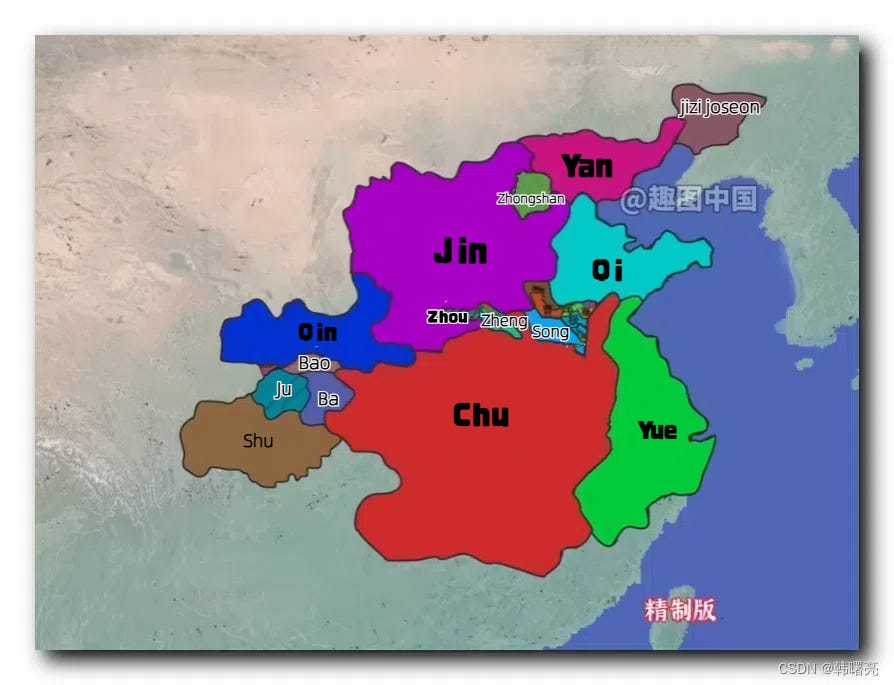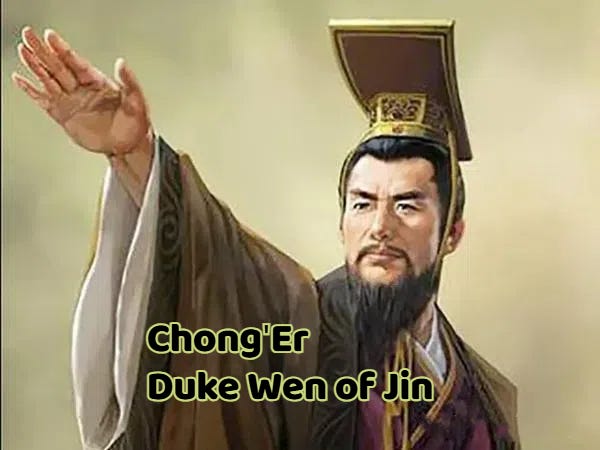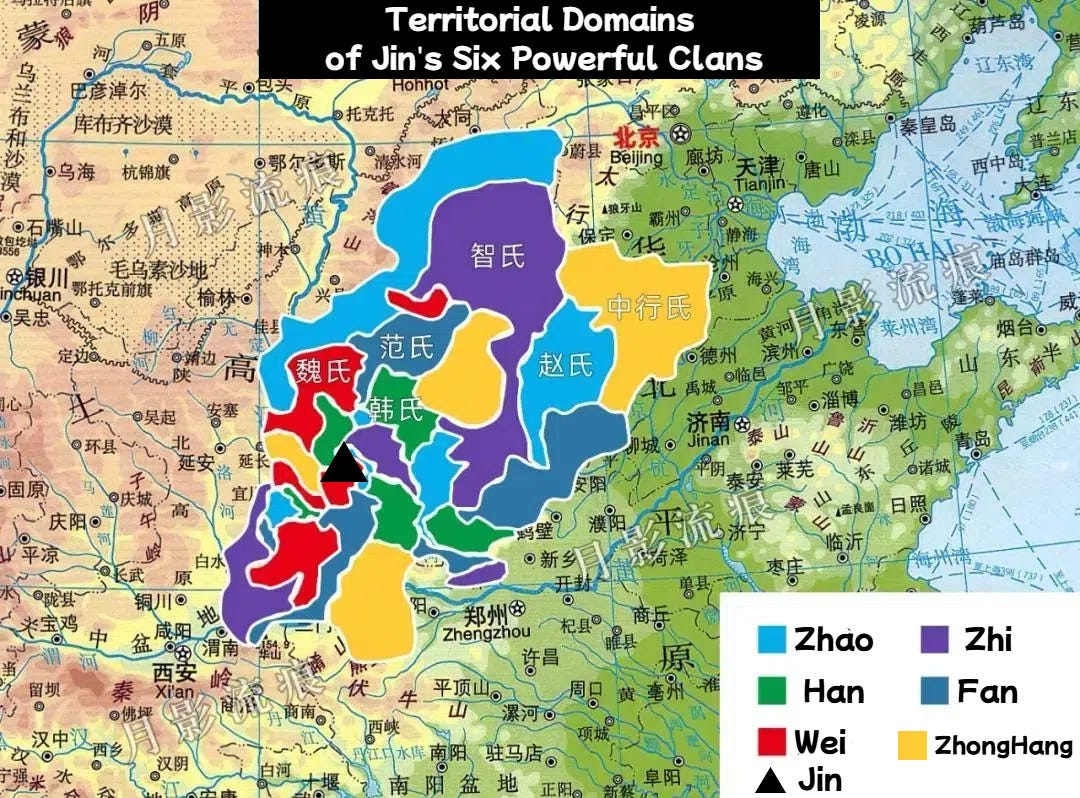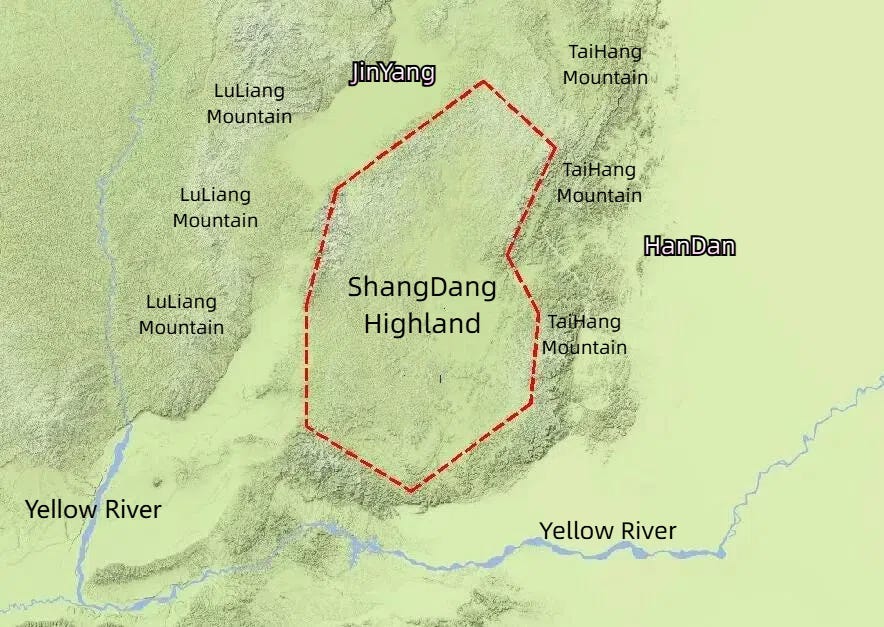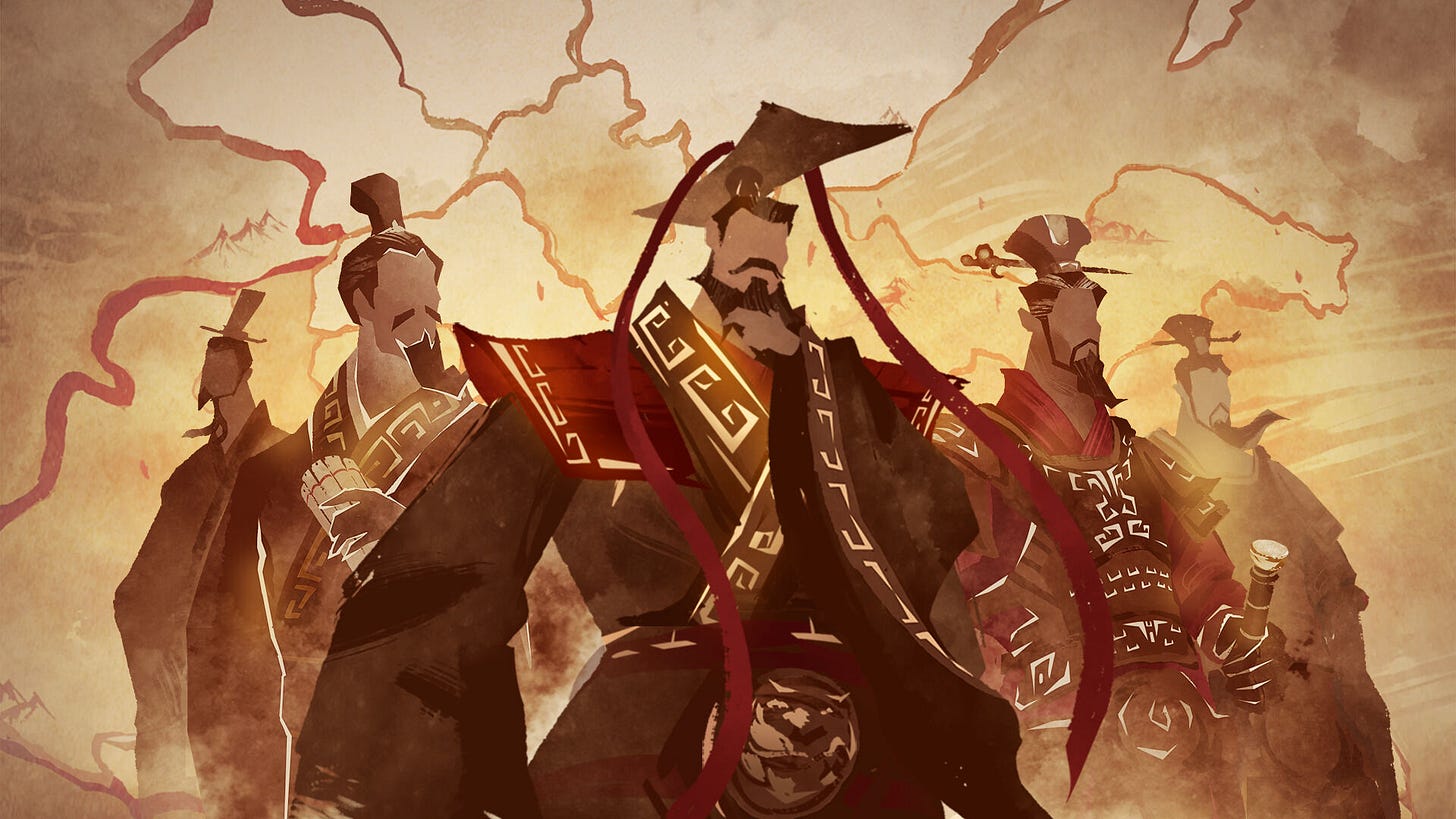Previous Chapter :What's the Warring States
History of Warring States Period(Catalog)
History of Three Kingdoms(Catalog)
To most modern Chinese, Shanxi山西 Province evokes little beyond coal and vinegar—yet historically, this land bore far richer, more profound, and resilient legacies.
Through the ages, Shanxi has weathered nearly every existential storm that challenged the Chinese nation, standing as the pivotal rudder at countless historical turning points.
Shanxi, abbreviated as "Jin晋", boasts countless historical legacies. This land witnessed the rise of numerous emperors and generals, yet its enduring name derives from an ancient kingdom whose extraordinary influence and historical significance remain unparalleled.
It became the undisputed heavyweight champion of this land for millennia.
The Jin State(1033-376BC) - the paramount power of the Spring and Autumn Period(770-476BC).
Jin's greatest historical contribution lies in its vital role as the protector of the nascent flame of Chinese civilization during its earliest emergence.
Without Jin, the ancestors of the Chinese people might have remained in barbarism.
Apart from Duke Huan of Qi's(齐桓公,reigned685-643BC) brief hegemony, throughout the Spring and Autumn Period, Jin single-handedly upheld the orthodox legacy of China's civilization. Standing firm as the central pillar, it alone resisted:
The eastern spears of Qi(齐1046-221BC)
The western hordes of Qin(秦770-207BC)
The southern wilds of Chu(楚10xx-223BC)
The northern nomads
Honoring the Zhou king while repelling the barbarians, Jin brought stability to the realm.
It can truly be said that without Jin, Chinese civilization might have perished, and the course of China's history would have been rewritten.
After all, countless civilizations worldwide succumbed to barbarian conquests. In its fragile infancy, Chinese civilization was particularly vulnerable - Jin served as the 1st primordial guardian of Chinese civilization.
Jin's domain encompassed the very heartland of ancient China: comprising all of modern Shanxi, western Hebei, northwestern He’nan, eastern Shaanxi, and western Shandong. Its demographic might, agricultural output, and military strength were so formidable that even after its dissolution, all three successor states remained among the Seven Great Powers of the Warring States period(476-221BC).
The map above shows the territory of Jin at its zenith. Compare this with the pitifully small domain of Qin during the same period.
Yet by the late Spring and Autumn period, this mighty Jin existed in name only—its ruler, the Jin Duke, had long lost actual control.
How did the Jin Duke lose his grip?
The answer lies in the feudal system we discussed in the previous chapter.
Just as the Zhou kings became figureheads when overshadowed by their vassals,
So too could the feudal lords be eclipsed by their own ministers.
It's like those gangster movies where the boss often gets overthrown by his own lieutenants.
The decline of the Jin ruler's authority stemmed largely from relentless infighting among the royal clans.
Jin's history was stained with bloody power struggles among royal menbers. Chong'er重耳, later known as Duke Wen of Jin (晋文公one of the Five Hegemons during Spring and Autumn period,reigned Jin State 636-628BC), was forced into 19 years of exile due to such vicious intra-clan conflicts.
Upon ascending the throne, Duke Wen—having witnessed firsthand his family's destructive feuds—instituted drastic preventive measures. The traumatic memories of kin betraying kin ran too deep.
Convinced that "no good ever comes from royal kinsmen," he made a historic shift: henceforth, Jin's chief ministers would be selected exclusively from non-royal aristocratic families.
This chief minister position—somewhat akin to the later-day chancellor or modern prime minister—was traditionally reserved for royal family members across various states, as it held comprehensive executive powers that rulers dared not entrust to outsiders.
By breaking this convention, Duke Wen of Jin indeed ended the royal clan's bloody infighting. However, over generations, these non-royal ministers evolved into formidable political factions— a new aristocracy of power known as the "Qing" (卿), who would ultimately eclipse the very throne they served.
By the late Spring and Autumn period, the Jin Duke had become virtually a mirror image of Emperor Xian of Han(汉献帝reigned 189-220AD)—except here, there wasn't just one Cao Cao, but multiple.
On the eve of the Partition of Jin, the real players in this game of thrones were six mighty clans:
The Zhi智
The Zhonghang中行
The Fan范
The Han韩
The Wei魏
The Zhao赵
Collectively known in history as "The Six Powerful Ministers of Jin", these aristocratic houses reduced the ducal court to a mere spectator in its own realm.
This map shows the six powerful clans' respective spheres of influence - a jagged, interlocking puzzle where each domain penetrated deep into another's territory. The Jin ducal house's direct holdings had shrunk to barely visible fragments.
Of these six powerful clans, most are forgotten today. History remembers only the final three that survived to partition Jin.
The Zhi, Fan, and Zhonghang houses never made it to the Warring States era.
Their premature exit from history's stage began with a treacherous maneuver by Zhao Yang赵鞅, the patriarch of the Zhao clan.
Beyond the six major clans, Jin also harbored smaller powers—like the Handan邯郸 clan, who controlled the strategic city Handan that would later become Zhao's capital.
The Handan and Zhao clans shared ancestral roots: generations earlier, a cadet branch of the Zhao had been enfeoffed at Handan, adopting the city's name as their own.
But after centuries, blood ties had thinned. The Handan clan had even changed their ancestral surname. And with Handan being such a prized territory—
"Don't blame me for betraying kin—blame Handan for being irresistible."
Yet Zhao Yang couldn't simply seize it outright. Open aggression would violate feudal norms and unite all clans against him. He needed a pretext — So he engineered an elaborate trap.
Three years prior, Zhao Yang had besieged the State of Wey(卫10xx - 209BC), intimidating them into offering 500 households as tribute. These 500 households became the bait in Zhao Yang's scheme—deliberately "gifted" to the Handan clan.
Some time later, Zhao Yang confronted Handan Wu邯郸午, the clan's leader: "Return my 500 households. Now."
Caught off guard, Handan Wu initially agreed. But the other members of Handan clan revolted.
Blinded by shortsightedness, they reasoned: “The mighty Zhao clan won't miss these mere peasants—after all, we share common ancestry! ”So they kept the households without another word.
A timeless lesson: Petty gains invite monumental losses. Whether pauper or prince, cultivate magnanimity—for stinginess of spirit carries the steepest price.
And let this be said: When jackals try to outfox lions, only the jackals end skinned.
Then one day, Zhao Yang launched a lightning strike—arresting Handan Wu and imprisoning him in Jinyang. A messenger was dispatched to the Handan clan with this ultimatum:
"Your leader broke faith over trifles. As senior patriarch, I shall execute him. Nominate his successor immediately."
The Handan clan had long viewed Zhao Yang as their indulgent elder. Now they learned the hard way: When lions stop pretending to be uncles, cubs get eaten.
Enraged, Handan Ji 邯郸稷(Handan Wu's son) renounced Zhao's authority: "No more shall we call you patriarch!"
This was precisely the casus belli Zhao Yang needed. Zhao troops marched on Handan—leaving the once-proud clan teetering on annihilation.
At this critical juncture, Handan Ji had a powerful ally—his maternal uncle Zhonghang Yin中行寅, the leader of the Zhonghang clan, one of the six powerful families of Jin.
In his hour of need, Handan Ji turned to his kinsmen for help.
Seeing that his nephew would perish without intervention, Zhonghang Yin agreed to lend his support. However, realizing that the Zhonghang clan alone was no match for the mighty Zhao, he sought reinforcements—forming a strategic alliance with the Fan clan, another of the six powerful families.
The combined forces of Zhonghang, Fan, and Handan not only repelled Zhao’s invading army but launched a relentless counterattack. The Zhao troops suffered a crushing defeat, and Zhao Yang was forced to retreat with his remaining forces to his stronghold at Jinyang晋阳 (modern-day Taiyuan).
Flush with victory, the Zhonghang and Fan clans saw an opportunity to annihilate the Zhao once and for all. They mobilized their full military might and laid siege to Jinyang, encircling the city completely.
And thus, the first Siege of Jinyang began !
To be Continued.
Your support is my greatest motivation!


